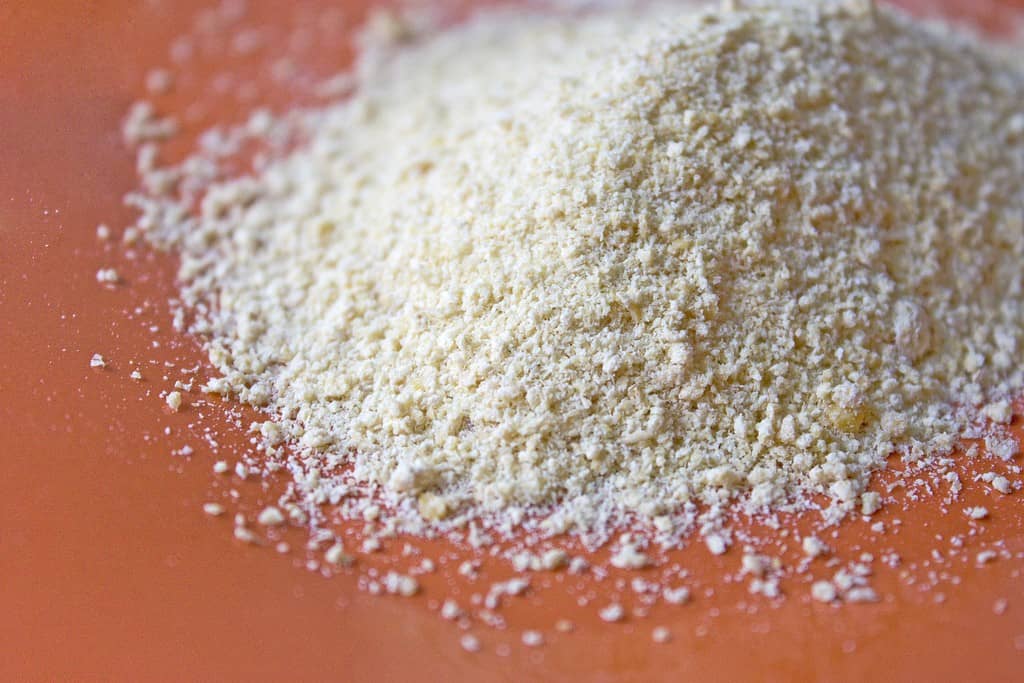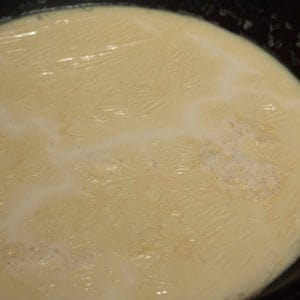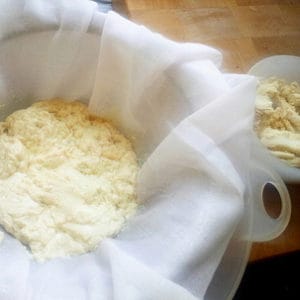For those who follow this blog closely, you'll know that I make my own soy milk and tofu. My current means for achieving this is with a Soy Quick soya milk maker, but the method isn't important because no matter who you do it you'll always be left with soy pulp from the ground beans.
I generally place the okara in muslin and press as much liquid out as possible before storing the pulp in the refrigerator, sealed. I've never had any issues cooking with okara based on this initial prep, but I realise it's difficult to follow a recipe when the liquid content of your okara may be slightly different than mine.
For that reason, I've decided to begin using dried okara in any recipes I write; below is the method for drying.
How to dry okara
- Preheat your oven to around 100 C (210 F). The exact temperature isn't important; you just want a low heat.
- Place a mesh colander over a large bowl and line the colander with thin muslin. If you're not worried about saving the soy milk you squeeze out then you can eliminate the use of the bowl (but it's good to save for cooking).
- Place your okara in the muslin, bundling the fabric up around the pulp. Squeeze as hard as is humanly possible in order to extract as much liquid is possible.
- Turn the now somewhat dried pulp out into an oven pan and spread as thinly and evenly as you can. Place in the oven, mixing every 15-20 minutes until the okara has dried out. This could take an hour or 4 hours depending on how much okara is on your baking sheet. For this reason I recommend re-reading the bit about spreading as thinly as possible. Use a second tray if need be.
- Once it's dry, remove the okara from the oven and allow to cool. Place the crumbs in a blender or food processor to break up and store in an air tight container.





Deleoncosm says
Ok so totally did this got a whole quart out of my okara and I couldn't find any info from anyone as to whether this soy milk was safe to add back into my other already separated soy milk sooo if you don't hear from me again you'll know the answer i guess ;P otherwise I followed all the steps and my bottom tray came out significantly darker than the above picture almost a golden brown my top tray/batch came out closer in color to the above pic...I'm not too familiar with drying things and my oven is tempermental to boot so I started pulling it out of oven when I was able to crunch the okara with the back of a fork and it crumbled easily and I could hear the crunch....HTH someone 😉
Kip says
My oven has been super tempermental as of late also. It's really annoying but I found keeping a third party oven thermometre in there helps a lot! I got mine in the states and it was cheap (less than a tenner). Good tip to occassionally break up the okara pieces during the process!
Zoë says
Hi! How long does dried okara keep for?
Thanks
Kip says
Hi Zoë,
If it's properly dried with no moisture then it will last awhile. I've kept it for several months before.
Monica says
thanks for the reply i was wondering the same.
Jez says
Does the dried okara keep well at room temperature in a cupboard or does it need to be refrigerated? Could it be used as a flour substitute?
Kip says
Hi Jez,
So long as it is devoid of moisture it will keep in a sealed container at room temperature. As for its use as a flour substitute, theoretically the answer is no but it would still work in some preparations depending on your purpose. Because it's free from both gluten and thickening starches, it wouldn't help to bind or glue anything. But if you are looking for an ingredient to add some bulk then okara will work. I know people who have used it in baking, for instance, to make muffins and breads that are higher in protein. But a straight 1:1 flour replacement would never work in the same recipes.
chris says
While not exactly a response to your "Could it be used as a flour substitute?" question, I have added wet and dry okara to sourdough bread making with excellent results
Judy says
Hi Chris, do you have an estimate of how much okara to your sourdough? I have started making sourdough and would love to add Okara. And are you adding dehydrated okara or wet?
Michael says
I bought some Okara flour from Renewal Mill to make Okara bread from a recipe I found online. The problem is, the recipes online only refer to "cooked okara' and I haven't been able to find any way to measure the equivalents of cooked Okara to Okara flour. I have spent about an hour online doing searches but no luck. Can you tell me what the equivalent amount of Okara flour to cooked Okara might be?
Thanks,
Michael
Kip says
Hi Michael,
It would be better for all of us who have written okara recipes to use the dried form as it is more reliably measurable. As for your question, which is a good one, it's not an easy one to answer. The reason is most people provide ingredient measures by volume rather than by weight. This means a single cup of okara used by an individual could weigh more than that of another person based on the liquid content left in the lees. A friend with a tofu business suggested to me that the weight dried can vary between half and 3/4 of the original volume, but that probably isn't the precise answer you are looking for. I have some frozen okara in my freezer that I will defrost, weigh, and dehydrate and will report back with the results...
Update:
From my measurements 1 cup of my fresh okara is 185 grams, and I had a total of around 515 grams (2 3/4 cups). After drying, the weight was 212 grams (approx 2 1/4 cups). So dried was about 80% the volume of fresh in this case.
Courtney says
Can I use this to bulk up protein in a similar way I would protein powder? Like adding to soups, smoothies, oat meal, etc?
Kip says
You could add it, but since I am not a nutritionist I cannot advise on that aspect...
Justin says
Hi! How much water should I add to the dry okara to reach the same-ish water content of your fresh okara? In other words, how do I rehydrate the dry stuff? I recently made my first batch of tofu (yay! Not going back to store bought) but I have no idea of what fresh okara should look like for it to be useable in a recipe. Thanks, Justin
Kip says
Hi Justin,
It's difficult to provide a wholly accurate response to this question, but if you scrolled back through the comments to look for my response to Michael, I provided some weight differentials that should give you an idea of how much liquid to add in order to achieve the same weight as fresh.
H says
Have you ever tried cooking raw okara in the microwave? Trying to look for different ways to cook it. Thanks
Kip says
I don't have space for a microwave so I've never tried, but if you try it I'd love to hear how it goes.
Mari Petey says
Why do my okara patties fall apart?
Kip says
Could be for a number of reasons. My initial guesses would be the dough is either too moist or there isn't enough of a binding agent (e.g. vital wheat gluten or flour).
Faye says
Thank you for the instructions for drying okara. I will soon be joining the ranks of home soy milk makers and am looking forward to using okara in it's various forms. 🙏🙏🙏
I reserve the right to improve malicious and trollish comments.